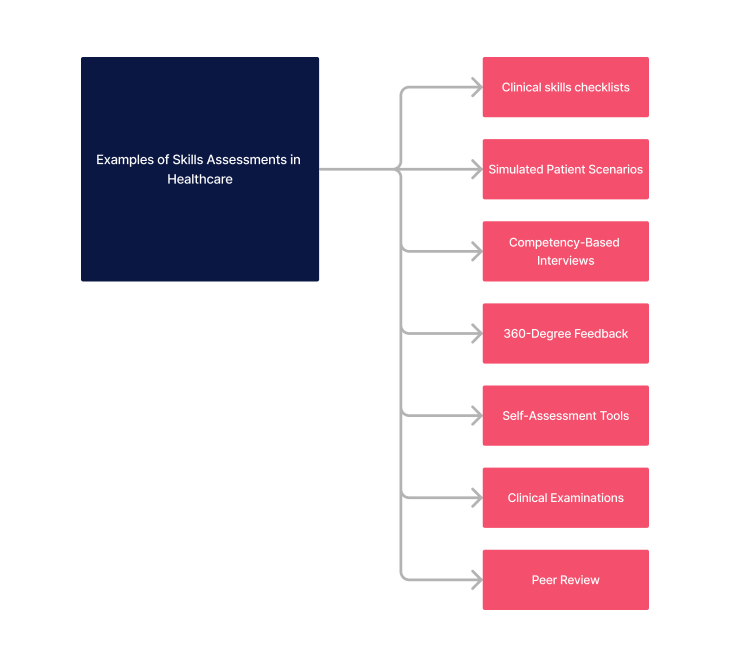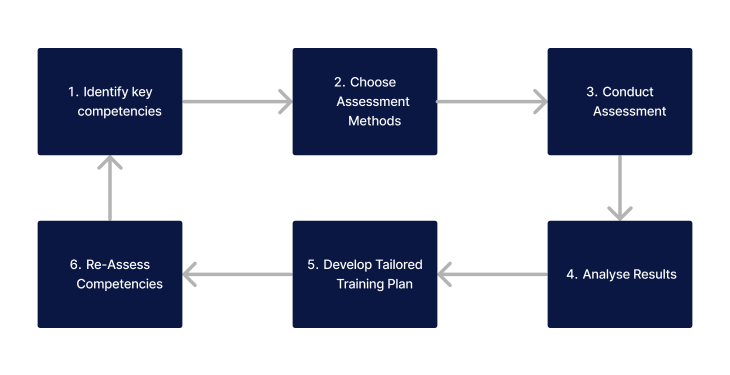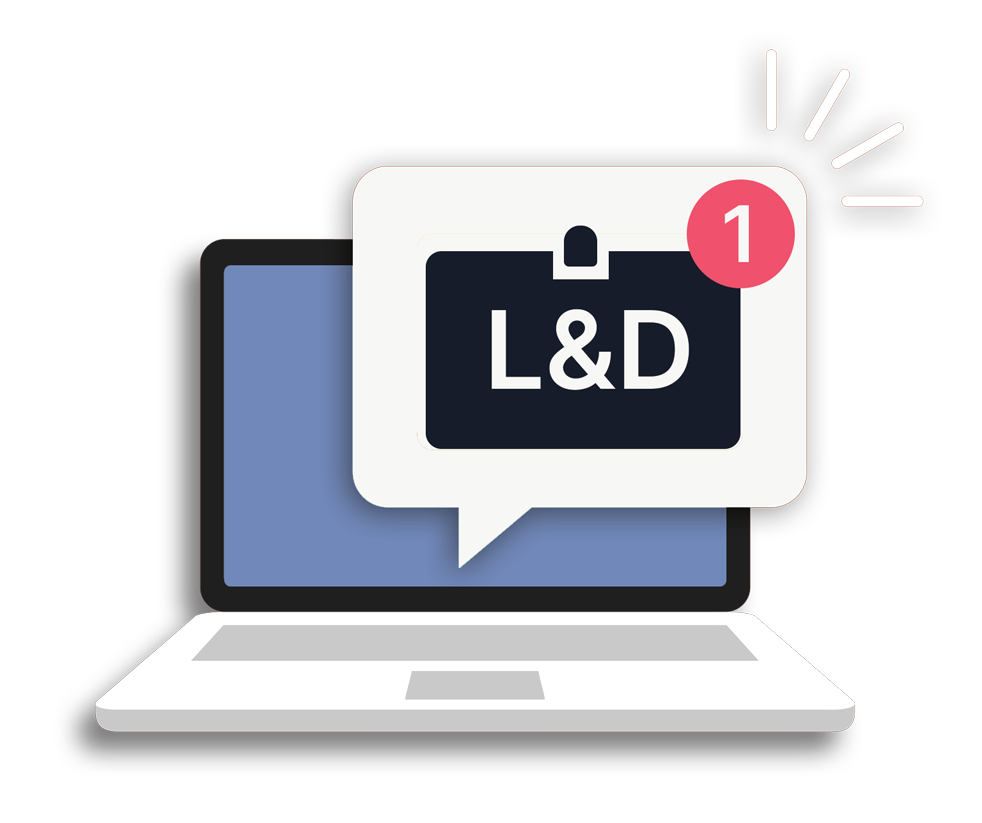What is a Skills Assessment?
A skills assessment is a systematic process used to identify and measure an individual's competencies, skills, and qualifications. In the healthcare sector, this process is crucial for aligning health professionals’ abilities with the needs of the health system, ensuring high-quality patient care and efficient health services.
Examples of Skills Assessment in Healthcare

Examples include clinical skill checklists, simulated patient scenarios, and competency-based interviews aimed at evaluating the practical abilities of allied health and primary care providers.
- Clinical Skill Checklists: A structured tool used to verify the proficiency in performing specific procedures or tasks. These checklists cover a wide range of skills, from basic patient care to more complex clinical interventions, ensuring that healthcare professionals meet the required standards of practice.
- Simulated Patient Scenarios: These scenarios involve role-playing exercises with actors or sophisticated mannequins mimicking patient conditions. Simulations are designed to replicate real-life clinical situations, allowing health professionals to practice and refine their diagnostic, procedural, and interpersonal skills in a risk-free environment.
- Competency-Based Interviews: This approach focuses on discussions that reveal an individual’s ability to apply their skills and knowledge in various situations. Interview questions are tailored to understand how candidates have used specific competencies in past roles, highlighting their experience and decision-making processes.
- 360-Degree Feedback: A comprehensive feedback system involving evaluations from a wide range of observers including peers, subordinates, and supervisors. This method provides a holistic view of an individual's performance, encompassing clinical skills, teamwork, communication, and leadership abilities.
- Self-Assessment Tools: Questionnaires and surveys designed for health professionals to evaluate their own skills, knowledge, and areas for improvement. Self-assessments encourage reflection on personal performance and professional development needs.
- Clinical Examinations: An approach to assess clinical and communication skills through a circuit of stations, where each station has a specific task related to patient care or interaction.
- Peer Review: A process where healthcare professionals review each other’s work to ensure it meets the required standards of care. Peer reviews can include case discussions, review of medical records, or observation of clinical practice, facilitating a culture of continuous improvement and learning.
What Methods of Skills Assessment Are There?
Common methods include:
| Method | Description |
|---|---|
| Direct Observation | Observers or supervisors directly watch the healthcare professional perform tasks in a real-world setting. This method is highly valuable for assessing hands-on skills and bedside manner, providing immediate feedback on clinical competencies. |
| Practical Tests | Structured tests designed to evaluate the ability to perform specific clinical procedures or tasks under controlled conditions. These tests often simulate real-life scenarios that a healthcare worker might encounter, ensuring that skills are both relevant and accurately demonstrated. |
| Self-Assessments | Healthcare professionals assess their own skills, knowledge, and performance through structured questionnaires or reflection tools. Self-assessment encourages personal growth and self-awareness by identifying strengths and areas for improvement. |
| Peer Reviews | A collaborative review process where colleagues assess each other's clinical performance, professional behavior, and overall contribution to the team. Peer reviews foster a supportive learning environment, promoting a culture of continuous improvement and mutual respect. |
What is The Skills Assessment Process for Managers?

Common methods include direct observation, practical tests, self-assessments, and peer reviews, each offering unique insights into the competencies of health professionals.
- Identify the key competencies required for various roles within your organisation.
- Choose the appropriate assessment method(s) based on the skills and experience needed.
- Conduct the assessment in a fair, consistent manner.
- Analyse the results to identify gaps and opportunities for professional development.
- Develop a tailored training plan to address identified needs.
- Implement a follow-up mechanism to reassess competencies after training.
How to Create a Skills Assessment?
To create an effective skills assessment, begin by defining clear objectives, selecting relevant assessment tools, and establishing benchmarks for performance evaluation. Other thing include:
- Define Clear Objectives: Start by clearly defining what you want to achieve with the skills assessment. Determine the specific skills, knowledge, and competencies you wish to evaluate. This will guide the overall direction and purpose of the assessment.
- Identify the Target Group: Understand who will be assessed. Knowing the target group's current skill level, roles, and responsibilities will help tailor the assessment to their specific needs and the organisation's expectations.
- Select Relevant Assessment Tools: Choose the tools and methods that best match the assessment objectives and the nature of the skills being assessed. Consider a mix of tools to cover a range of competencies, such as practical tests, simulations, self-assessments, and peer reviews.
- Establish Benchmarks for Performance Evaluation: Define clear criteria and standards for what constitutes satisfactory performance at different levels. These benchmarks will serve as a reference for evaluating the assessment results.
- Design the Assessment Content: Develop the actual content of the assessment, including questions, tasks, or activities that accurately reflect the competencies being evaluated. Ensure the content is valid, reliable, and unbiased.
- Plan the Assessment Administration: Decide how and when the assessment will be conducted. Consider factors such as the environment (online or in-person), timing, and the resources needed to administer the assessment effectively.
- Conduct a Pilot Test: Before full implementation, conduct a pilot test of the assessment with a small, representative sample of the target group. This helps identify any issues or areas for improvement in the assessment design and administration.
- Implement the Assessment: Carry out the assessment according to the planned process, ensuring all participants understand the purpose, process, and expectations.
- Analyse and Interpret the Results: After the assessment, analyse the results to identify patterns, strengths, weaknesses, and development needs. This analysis should inform decision-making regarding training, development, and performance management.
- Provide Feedback: Offer constructive feedback to participants based on the assessment results. Feedback should be specific, actionable, and focused on development opportunities.
- Review and Refine the Assessment: Finally, evaluate the overall effectiveness of the assessment process. Seek feedback from participants and assessors to identify areas for improvement. Use this information to refine future assessments.
Advantages and Disadvantages of Skills Assessments in Healthcare
| Advantages | Disadvantages |
|---|---|
| Healthcare professionals have necessary competencies for high-quality care. | Potential for bias in assessment design and administration can unfairly influence outcomes. |
| Staff development facilitates targeted professional development through identification of strengths and improvement areas | Resource requires significant time, money, and effort, possibly diverting resources from other areas. |
| Enhanced team performance promotes a culture of continuous learning and accountability, improving teamwork in patient care. | The assessment process can be stressful, impacting performance and well-being. |
| Better resource allocation allows for strategic planning and allocation of resources by understanding team skill sets. | Compliance and privacy concerns when managing sensitive assessment data must comply with privacy laws, challenging data management and security. |
Related Resources
- Guide to Building a Competency Framework for Skill Development
- Identifying Skill Gaps with Learning Analytics
- How to Perform Post-Training Assessments
- Reporting on Staff Training in Aged Care
- How to Design Reporting Frameworks for Your L&D Program
- How Do I Use Learning Analytics for Competency Mapping?
Conclusion
Effective skills assessment is vital for maintaining high standards in healthcare. By systematically evaluating and developing the competencies of health professionals, managers can ensure their teams are well-equipped to meet the challenges of the Australian health system.
References
- Green, A and Hug, M, 2020, Simulation training and skill assessment in EMS.
- Medina, MS, Castleberry, AN, and Persky, AM, 2017, 'Strategies for improving learner metacognition in health professional education', American journal of pharmaceutical education, vol.81, no.4, p.78
- Perry, AG, Potter, PA, Ostendorf, WR & Laplante, N, 2021 'Clinical Nursing Skills and Techniques-E-Book: Clinical Nursing Skills and Techniques-E-Book', Elsevier Health Sciences.
- Stark, E, Kintz, S, Pestorious, C & Teriba, A, 2018,'Assessment for learning: Using programmatic assessment requirements as an opportunity to develop information literacy and data skills in undergraduate students', Assessment & Evaluation in Higher Education, vol.43, no.7, pp.1061-1068.


